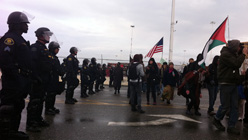During our coverage of the Oakland port shutdown yesterday, we wrote a little bit about labor's decidedly tepid if not negative response to Occupy Oakland's protest on behalf of Longview, Washington ILWU workers in a dispute with the grain exporter EGT.

The leadership of the ILWU as well as various locals declared their opposition to the action. From Chronicle columnist Andrew S. Ross this weekend, Union not keen on new Occupy Oakland:
(T)he folks [protesters] purport to be in solidarity with don't seem hot on the idea to "effectively shut down the hubs of commerce" at all.
"Any actions organized by outside groups, including the proposed Dec. 12 shutdown of various terminals on the West Coast, have not been vetted by our union's democratically led process," the International Longshore and Warehouse Union said. "Any decisions made by groups outside of the union's democratic process do not hold water, regardless of the intent."
The Occupy movements that make a fetish of applying direct democracy and near absolute consensus to its own decision making might want to take note of that.
Richard Mead, president of ILWU Local 10, which represents dockworkers at the Port of Oakland, said, "Our position is in the international's press release. We're not facilitating (Occupy Oakland's strike call) in any way. We just want that clear."
Jeff Smith, president of ILWU Local 8 in Portland, Ore., went further, telling the Portland Tribune his union won't honor picket lines. "This is a third-party strike. We have to go to work," he said.
But the Occupy movement says the union rank and file supported the protest. Occupy Oakland's Barucha Peller, who participated in the organizing of the attempted port shutdowns, said this to KQED's Mina Kim during the planning stages of the port action:
"The rank and file traditionally will honor community picket lines around social justice issues. I think the longshoremen are not unaware of the aims of the Occupy movement and a lot of those aims speak to them as well. Rank and file are also part of the Occupy movement, not separate. Across the board, rank and file union members as well as non-unionized workers, make up a large part of the Occupy movement."
But whether the majority of affected union members actually supported yesterday's action -- or not -- I'm not sure anyone really knows. Here's a comment we received on the blog yesterday:
I'm a union worker. I lost a much needed day of pay today. I went to observe the occupiers for hours today. FACT: Most workers were upset with them. FACT: There were only a handful of people that worked there involved in the protest. Most union and non union port workers were upset and negatively affected financially.
Yesterday, at the protest, KQED News Intern Rebecca Wolfson interviewed a business rep for the machinists union, which represents some port workers. Garry Horrocks had this to say:
I think a lot of union members are split because philosophically they believe in what's going on but there's contractual issues the unions have to recognize, and they have liabilities and assets to lose if they don't follow the legalities in the contract.
There's what they call a fiduciary responsiblity of the members of the union to protect the assets, bc if ther are no assets, there's no funding, there's no revolution, there's no unions.
Yesterday, on KQED Radio's Forum show, ILWU Communications Director Craig Merrilees expressed support for the Occupy movement while somewhat gingerly reaffirming the union's opposition to the port action:
I think almost everyone in the ILWU supports the goals of the 99% and nobody's done more than the Occupy movement to raise that issue. They've done a fabulous job of changing the debate in this country in a positive way so that people begin to have a sense of power. The ILWU has a long history of social justice and that kind of activism is part of the culture of this union.
As for this particular day, the union is not taking a position supporting this action, but that was really because of the lack of a process to allow the longshore workers – the rank and file, members – to participate in that decision.
But there are individuals who are exercising their First Amendment rights to take a stand, but the union itself is not in that position today.
When asked if the union was "ticked off" that it wasn't consulted in the decision to demonstrate, he said, "I don't think ticked off is the right word in any way. There's a position of respect here; I think the ILWU is grateful and respectful that people are standing up and raising concerns about the injustice that's taking place in America….there continues to be a lot of good feeling towards the thrust of what folks in the Occupy movement are trying to achieve."